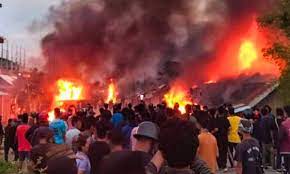
In the northeastern Indian state of Manipur, peace remains an elusive dream as the region grapples with the aftermath of ethnic violence that erupted five months ago. Families affected by the violence are still waiting for justice and closure, with some not even knowing the fate of their loved ones. The situation highlights the deep-seated ethnic divisions that have plagued Manipur for years.
The violence began on May 3 after a tribal solidarity march protested a Manipur High Court order that called for considering the Meiteis, the ethnic majority in the state, to be included in the scheduled tribe fold. Although the state had yet to act on the court order, the protests quickly escalated, leading to widespread unrest across Manipur. Official numbers report 178 people dead and over 50,000 displaced from their homes.
Over the past five months, Manipur has witnessed homes being burnt, businesses lost, education disrupted, and places of worship reduced to ashes. The state endured months without internet access, further isolating communities. However, amid these challenges, there are still families who have received no justice or closure.
One heartbreaking case is that of 21-year-old college student Hanglalmuan Vaiphei, who was arrested for a Facebook post targeting the Meiteis and Chief Minister N Biren Singh. On May 3, while being transported from a court in Imphal to Sajiwa Jail, Hanglalmuan was attacked by an armed mob and beaten to death. His mother, Thiamneihat, revealed that the family has received no updates on the case, and justice remains elusive.
In another heart-wrenching story, Kavita Singh, whose husband Atom Samarendra Singh went missing along with his friend Yumkhaibam Kirankumar Singh, is still searching for answers. Five months have passed, and there is no trace of the two men or their car. Kavita Singh’s plea to have the case handed over to the Central Bureau of Investigation (CBI) remains unanswered, and the police have not provided any updates on the investigation. The family also faces financial hardship as her husband’s salary has not been paid.
The ethnic tensions in Manipur have divided communities, rendering tribal districts inaccessible to the Meiteis and the Imphal valley off-limits to the tribal Kukis. The state struggles to return to normalcy, with intermittent periods of relative calm punctuated by outbreaks of violence. The divide extends to all aspects of life, including civil society, law enforcement, administration, and politics, further exacerbating the challenges.
Security forces on the ground note that the situation could have been easier to contain if not for the widespread looting of arms and ammunition from government armories. Nearly 4,500 weapons and around 650,000 rounds of ammunition are reported missing, with only a fraction recovered. Investigations into the violence have been hampered by internal migration, with Meiteis fleeing Kuki-dominated areas for the Imphal Valley, and Kukis seeking refuge in the hills.
The road to peace in Manipur remains long, with tensions still running high. In Churachandpur, Imphal, and across the state, Manipur continues to mourn its losses. As the search for justice and reconciliation continues, the people of Manipur hope for a future where ethnic divisions no longer cast a shadow over their lives.
Sources By Agencies




